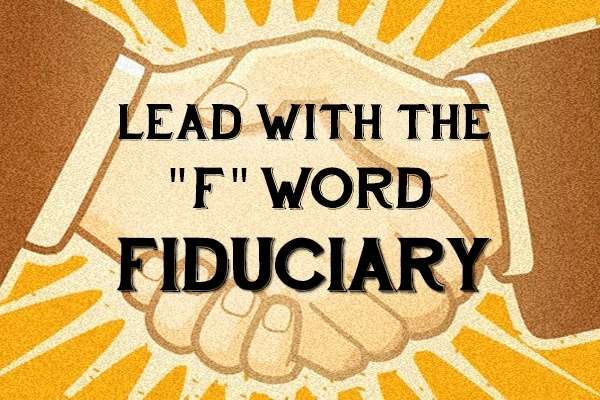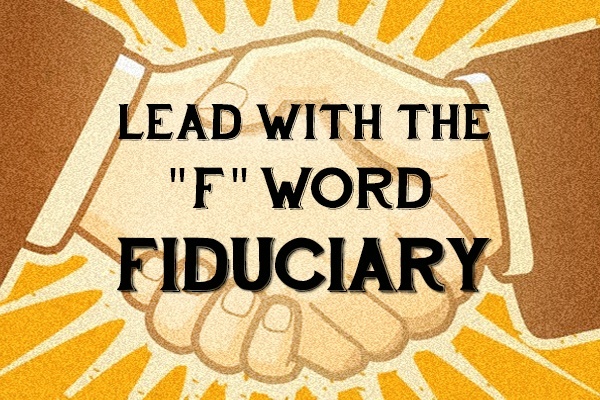
The Worth of Sage Advice Part III: What’s Driving Your Advisor Relationship?

In our last post, “Good, Better and Best Advisor Value,” we shared some reasons we feel it’s worth working with a professional financial advisor rather than going it alone. As we continue to explore the worth of sage advice this month, we’ll describe how to identify, not just any advisor, but one who is best positioned to justify his or her worth.
As much as great advice can be of great value, so too can bad advice cause irreparable harm. Still, just as you wouldn’t walk everywhere you go because cars can be very dangerous (a lesson I learned first-hand), you shouldn’t avoid all professional financial advice just because there are some lemons in the lot. Instead, we recommend that you proceed with caution, armed with information.
Lead with the “F” Word (Fiduciary)
In our opinion, among the most important qualifications for financial intermediaries who wish to dispense investment or financial advice should be this: They should be providing fiduciary-levels of advice, and they should be willing to agree to do so in writing.
Bottom line, a fiduciary advisor is obligated to place your highest financial interests above all else, and never dispense any advice that doesn’t advance that goal.
You would think that investors should be able to assume they are receiving this level of advice when they consult with a financial professional. It should be as “no duh,” as some of the other points we covered in “Obvious Man Takes on the Wealth Advisor World.”
Unfortunately it is not. It’s critical to be aware that brokers who dispense “suitable” (versus fiduciary) advice are not bound to these highest standards. As described in this recent New York Times piece, “Before the Advice, Check Out the Adviser”:
“This creates a muddle for investors. Say you sit down with a broker — one who isn’t legally required to act as a fiduciary — and the broker has access to a dozen mutual funds, all of which are deemed “suitable” for a particular customer. The broker can recommend the most expensive fund, even if it makes him more money at the consumer’s expense and isn’t preferable in any other way.”
In short, just because somebody has a job title containing the word “advisor” or “adviser,” does NOT mean the advice is necessarily worth heeding.
Muddle, Muddle, Toil and Trouble
One way you can tell if the advice you’re receiving is fiduciary is to determine whether the individual is an independent Registered Investment Advisor firm representative (who is subject to a fiduciary standard of care), or a broker, banker or insurance agent (whose advice need only be suitable). You may also want to see if your would-be advisor will sign a fiduciary oath. As described in the aforementioned NYT piece by Andrew Stoltmann, a Chicago securities lawyer: “If the adviser refused to sign [a fiduciary oath], then the investor should run for the hills.”
Doing Your Advisor Due-Diligence
Beyond seeking a fiduciary advisor, there are a number of questions with which you can pepper the conversation when assessing an advisor’s worth.
- Account Management – Will your assets be held by a separate custodian who reports to you directly, so you can independently monitor the advisor’s activities? (To avoid Bernie-Madoff-like scams.)
- Professional Experience – Does your advisor possess stellar professional credentials and industry experience?
- Disclosures – Does the advisor’s firm have a Form ADV? True investment advisors are required to file this report, which discloses important details such as fee structures, any conflicts of interest and any disciplinary actions taken.
- Costs – Speaking of fee structures, what are the advisor’s source(s) of compensation? Is the firm Fee-Only, which means all compensation comes from you, the client? Or do they accept commissions or other sources of compensation from outside sources?
- Investment Strategy – Will your advisor help you manage your investment portfolio as an integrated whole driven by your personal long-term goals? Or is he/she more transaction-oriented, driven by uncontrollable market events?
- Financial Life Planning – Is the advisor prepared to help you manage additional components in your family wealth as a coordinated whole, such as estate planning, risk management, executive compensation packages, philanthropic activities and more?
Whew, these should get you started. But let’s be real. An advisor like Bernie Madoff who is bent on destruction could have all the seemingly right answers, and still steer you wrong. Even after selecting an advisor, it’s important to verify that he or she is continuing to add ongoing, credible value to your investment experience as you move forward. In our next post, we’ll explore the concept of advisor “alpha,” as an empirical way to assess that worth.
Sage Serendipity: Compliments of Ted-Ed, this is your brain on music.
 Secure Document Sharing
Secure Document Sharing


